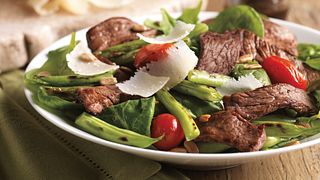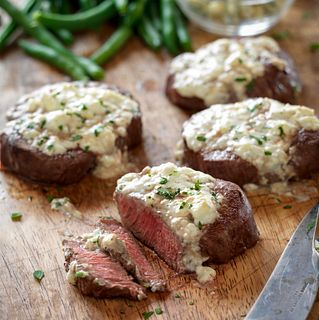Enjoy beef as part of a heart-healthy lifestyle

Beef is part of a satisfying heart-healthy lifestyle. All beef is a natural source of 10 essential nutrients such as protein, iron, zinc and B vitamins. Research shows that lean beef enjoyed as part of a heart-healthy diet and exercises, can help lower cholesterol, lose weight and lower blood pressure.
MEDITERRANEAN-STYLE DIET STUDY
New study shows a Mediterranean-style eating pattern that includes lean, unprocessed red meat can improve cardiometabolic risk factors.3
BEEFWISE RESEARCH
New research published in Obesity Science & Practice, the Beef WISE (Weight Improvement, Satisfaction and Energy) study, shows that eating lean beef four or more times a week, as part of a healthy, higher-protein diet, combined with physical activity, can help people lose weight and fat mass while maintaining lean muscle, and supporting heart health, such as lowering total or LDL cholesterol and blood pressure.
BOLD STUDY
The Beef in an Optimal Lean Diet (BOLD) study, conducted by researchers at The Pennsylvania State University, found consuming lean beef daily as part of a heart-healthy diet lowered LDL "bad" cholesterol by 10 percent, which was just as effective as the DASH diet. This research provides convincing support that nutrient-rich lean beef can be an everyday part of a heart-healthy diet.
"Lean or extra lean beef can be one of the proteins you enjoy in a heart-healthy diet. A recent study1 showed that up to 4-5.5 ounces of lean beef, eaten daily as part of a heart-healthy diet and an active lifestyle, can help lower cholesterol"
- Kevin Campbell, MD, Cardiologist
What does "Lean" Mean?
To be considered lean, a 3-oz serving of cooked beef must have less than 10 grams of total fat, 4.5 grams or less of saturated fat, and less than 95 mg of cholesterol.
MAJORITY OF BEEF CUTS ARE LEAN
Majority of beef cuts in the stores are lean. Look for the word "loin", "round" and 95% ground beef in the name. Here are just a few samples of your favorite lean beef cuts:
Certified Heart-Healthy Recipes
Did you know these beef recipes meet the requirements for American Heart Association heart-healthy foods as part of an overall healthy dietary pattern? Enjoying lean beef in a heart-healthy lifestyle is easier than you think with these recipes featuring lean beef, fresh fruit and vegetables, and whole grains. These recipes are all certified by the American Heart Association®.
SMALL STEPS FOR BIG RESULTS TO IMPROVE HEART HEALTH
AIM FOR A HEALTHY WEIGHT
Protein plays an important role in weight management by helping you stay full longer, supporting lean bodies and reducing risk of chronic diseases.
GO LEAN WITH 25-30 G PROTEIN AT EACH MEAL
Evidence shows that it's important to evenly spread protein intake thoughout the day. Doing this at breakfast, lunch, and dinner helps to improve fullness and preserve muscle mass.
MAKE HALF YOUR PLATE FRUITS AND VEGETABLES
Fruits and vegetable provide the fiber and nutrients required for managing your cholesterol.
A LITTLE MOVEMENT GOES A LONG WAY
Aim for between 30-60 minutes of moderate intensity exercise most days. Start slowly and make it fun.
Fitness Nutrition Tips
Whether you are exercising for fitness or training for a race, keep these nutrition tips in mind to get the best effect from your workout:
- A good sports diet is based on a balanced diet every day. Keep 3 principles in mind: 1) adequate fuel for your workout, 2) proper hydration, and 3) adequate recovery nutrients immediately after your workout.
- Essential nutrients to fuel an active lifestyle are protein, iron, and
zinc - in addition to carbohydrates. Protein helps maintain weight loss and
build lean muscle mass.
- Think recovery. Studies show within 45 minutes after your training is
the best time to replenish body fuel and to strengthen lean muscles.
- What beverages are best? The ideal beverage should replenish hydration,
electrolytes and some carbs. Sports drinks such as Gatorade are good choices
that provide all three.
- Learn more.
- Roussell MA, Hill AM, Gaugler TL, West SG, Vanden Heuvel JP, Alaupovic P, Gillies PJ, Kris-Etherton PM. Beef in an Optimal Lean Diet study: effects on lipids, lipoproteins, and apolipoproteins. Am J Clin Nutr 2012; 95
- Sayer RD, et al. Equivalent reductions in body weight during the Beef WISE Study: Beef’s Role in Weight Improvement, Satisfaction, and Energy. Obes Sci Pract 2017. Available at: http://onlinelibrary.wiley.com/doi/10.1002/osp4.118/full
- O'Connor LE, Paddon-Jones D, Wright AJ, Campbell WW. A Mediterranean-style eating pattern with lean, unprocessed red meat has cardiometabolic benefits for adults who are overweight or obese in a randomized, crossover, controlled feeding trial. Am J Clin Nutr 2018, nqy075. https://academic.oup.com/ajcn/advance-article/doi/10.1093/ajcn/nqy075/5036105






Share This Page